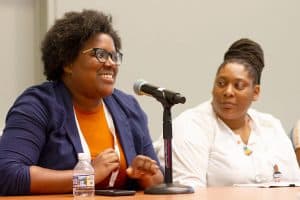
George Takei, who first found fame in the 1960s as Lt. Sulu in the cult-classic TV show Star Trek and later in life as an activist and social media celebrity, began his talk Monday morning at the American Library Association’s 2019 Annual Conference and Exhibition in Washington, D.C., with remarks on the size and enthusiasm of the crowd gathered to hear him.
“I feel like I’m at a Star Trek convention,” he said in his trademark baritone, before laughing heartily.
Takei’s tone changed, however, as he began to describe a childhood spent in internment camps for Japanese Americans during World War II—an experience that he details in his new YA graphic novel, They Called Us Enemy. With a straight face and somber tone, Takei shared how his family were stripped of their home and possessions and were shipped across the country from Los Angeles to a camp in Arkansas. On top of the degrading treatment, they were branded as enemies of the US despite being US citizens.
“Suddenly we were the enemy because we looked like people who bombed Pearl Harbor,” he said. “We were born here, raised here, and educated here. It was completely irrational.”
The experience traumatizes Takei into the present.
“I can still remember the terror of that horrible morning,” he said, recounting the day that he and his family were forced at gunpoint from their home.
Takei and his family spent four years in the camps, first in Alabama and then in California. Takei said he remembers witnessing riots and experiencing punishing hardships, but most of his memories about life in the camp aren’t necessarily negative. His parents shielded him and his younger siblings from the horrors of the camp, he said. It wasn’t until he got older and started researching and discussing those years with his father that he began to understand the full scope of his experience.
Despite the mistreatment, Takei remains hopeful about his country. He said that a people’s democracy like the US and those at its head are fallible. He hopes that by telling his story, present and future generations will learn from it and not repeat the same mistakes. Takei said his story is not unique and similar injustices can be found throughout US history.
“This is an American story,” he said. “Our past is filled with chapters like mine. There’s a continuing cycle of injustice.” Takei then drew parallels between the internment of Japanese Americans and the current conditions experienced by undocumented immigrants along the US border and the racism of the Trump administration’s proposed Muslim travel ban.
For the second half of his program, Takei was joined by the creative team responsible for bringing They Called Us Enemy to life: artist Harmony Becker and coauthors Steven Scott and Justin Eisinger. The trio praised working with Takei and noted that telling his story in a graphic novel format will help it reach a new, impressionable audience.
“This is a history book,” Eisinger said. “We want to pass [that history] to a new generation of people.”


